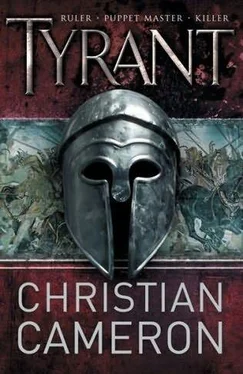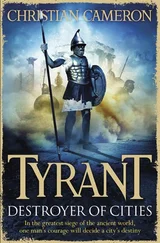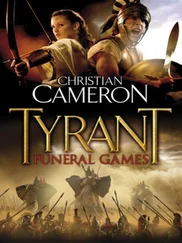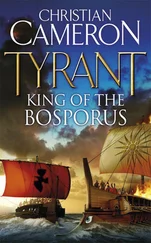Christian Cameron - Tyrant
Здесь есть возможность читать онлайн «Christian Cameron - Tyrant» весь текст электронной книги совершенно бесплатно (целиком полную версию без сокращений). В некоторых случаях можно слушать аудио, скачать через торрент в формате fb2 и присутствует краткое содержание. Жанр: Исторические приключения, на английском языке. Описание произведения, (предисловие) а так же отзывы посетителей доступны на портале библиотеки ЛибКат.
- Название:Tyrant
- Автор:
- Жанр:
- Год:неизвестен
- ISBN:нет данных
- Рейтинг книги:4 / 5. Голосов: 1
-
Избранное:Добавить в избранное
- Отзывы:
-
Ваша оценка:
- 80
- 1
- 2
- 3
- 4
- 5
Tyrant: краткое содержание, описание и аннотация
Предлагаем к чтению аннотацию, описание, краткое содержание или предисловие (зависит от того, что написал сам автор книги «Tyrant»). Если вы не нашли необходимую информацию о книге — напишите в комментариях, мы постараемся отыскать её.
Tyrant — читать онлайн бесплатно полную книгу (весь текст) целиком
Ниже представлен текст книги, разбитый по страницам. Система сохранения места последней прочитанной страницы, позволяет с удобством читать онлайн бесплатно книгу «Tyrant», без необходимости каждый раз заново искать на чём Вы остановились. Поставьте закладку, и сможете в любой момент перейти на страницу, на которой закончили чтение.
Интервал:
Закладка:
The young man that Calchus had wrestled earlier was quite beautiful as he came up to pay respectful comments to the wrestlers. Kineas was unmoved by male beauty, but he appreciated it as much as any Hellene and he smiled at the earnest young man.
‘I’m Ajax,’ the young man said in reply to Kineas’s smile. ‘My father is Isokles. May I say how well you fought? Indeed, I…’ He hesitated, swallowed his words, and was silent.
Kineas read him easily — he was an observant youth. He was going to say that Kineas had looked the better wrestler. A smart boy. Kineas put a hand on the smooth skin of the boy’s shoulder. ‘I always imagined Ajax would be bigger.’
‘He’s heard that stupid joke his whole life,’ said the father.
‘I try to grow to fit it,’ Ajax returned. ‘And there was a smaller Ajax, too.’
‘Do you box? Care to exchange a few cuffs?’ Kineas gestured at the straps for boxers, and the boy’s face lit up. He looked at his father, who shook his head with mock indignation. ‘Don’t get too cut up, or no one will want to take you home from the symposium,’ he said. He winked at Kineas. ‘Or should I say, get cut up, so you won’t get taken home? Have kids of your own?’
Kineas shook his head. ‘Well, it’s an experience. Anyway, feel free to put a few welts on him.’
Diodorus helped them both wrap their hands, and then they began, starting as if by mutual consent with simple routines, blows and blocks, and then moving to longer exchanges and thence to sparring.
The boy was good — better than a farm boy in a Euxine backwater had any right to be. His arms were longer than they looked and he could feint, rolling his shoulders to telegraph a roundhouse that never came and then punching short with the off arm. He stretched Kineas, now fully warmed up and eager; a short blow to his cheek gave him some personal interest in the contest, and suddenly they were at it.
Kineas was unaware that they drew every citizen in the gymnasium. His world limited itself to his wrapped hands and those of his opponent, his eyes and torso. In one flurry, each of them jabbed ten or twelve times, parrying each blow with an upper arm, or taking one high on the chest to deliver one to the head.
The flurry ended in a round of applause that moved them apart. They eyed each other warily, still charged with the daimon of combat, but the surge of spirit soon dwindled and they became mere mortals in a provincial gymnasium again. They shook hands warmly.
‘Again?’ said the boy, and Kineas shook his head.
‘Won’t be that good again. Keep it as it is.’ Then, after a pause, ‘You’re very good.’
The boy hung his head with real modesty. ‘I was going as fast as I could. I don’t usually. You are better than anyone here.’
Kineas shrugged and called over the boy’s head to his father, proclaiming how talented his son was. It was an effective way of making friends in the gymnasium. Everyone wanted to congratulate him on his skill, on the beauty of the moment. It made him happy. But he needed a massage and a rest, and he said so, declining innumerable offers of further contests until someone said they were all going to throw javelins and he couldn’t resist. He followed them outside and felt a pang — Philokles, forgotten or ignored, was running laps outside around a big field full of sheep.
Kineas didn’t know what to do with the Spartan, who seemed to have become a dependant. Gentlemen weren’t supposed to be so bereft, but Kineas suspected that he himself wouldn’t have been much different if he had washed up on an alien shore with no belongings and no home. He waved. Philokles waved back.
A slave herded the sheep well down the field and the men started to throw. It wasn’t a formal game; older men who were disgusted by their first throw took a second or even a third until they were satisfied, whereas younger men had to suffice themselves with one throw. It would never have done at the Olympic games, but it was comfortable, as the shadows shortened, to lie on the grass (mindful of the sheep turds) and watch the whole community of men compete. Kineas was conscious of his legs and the imperfections of his body, but he’d proven himself an athlete and was one of them now, making easy conversation with Isokles about the olive harvest in Attica and the problems of shipping olive oil.
Calchus threw with a great cry, and his javelin came close enough to make one of the sheep move with unaccustomed speed. He laughed. ‘That’s the best so far. I have a mind to throw again — they’re my sheep, we could all eat mutton tonight.’
Kineas was to throw next to last and Philokles last, places of honour because they were guests. Diodorus had thrown early — a good throw, with no grunt or cry, beaten only by Calchus. Most of the other towns-men had been competent, but the youth Ajax had surprised Kineas by his poor throw. Isokles had beaten it, throwing well, if short of the final mark, and he’d teased his son.
Kineas was used to throwing from horseback, and he threw too flat, but it was still a long throw — again the sheep started as his javelin landed close to them.
Calchus winced. ‘You’ve become an athlete while I run to fat in exile,’ he said.
Philokles picked up several javelins before choosing one. He walked over to Calchus, who was talking business with another man. ‘This is scarcely sporting. I’m a Spartan.’ He said it with a smile, an overweight Spartan showing a sense of humor.
Calchus didn’t understand. He indicated with a flick of his head that he had been interrupted. ‘If you can do better than we have, let’s see it.’
Nettled, Philokles gestured at the sheep. ‘How much for the straggling ewe?’
Calchus ignored him, returning to his conversation and then jerked his head around in time to see Philokles throw, arching his body and almost leaving the ground. The javelin leaped from his hand, flew high and descended fast. It knocked the ewe to the ground, all four feet splayed, the bolt from heaven pinning her to the ground through her skull.
There was a moment of shocked silence and then Kineas began to applaud. Then they all applauded the throw and teased Calchus about his ewe, suggesting various prices for her, some obscene, until Calchus laughed. Most of the town’s social interaction seemed to revolve around keeping Calchus pleased. Kineas didn’t like to watch it.
Isokles pointed down the field. ‘Let’s have a run,’ he said. And they set the distances and were off, running for a while in a pack until the better runners grew bored and took off. They circled the field three times, a good distance, and finished in the yard of the gymnasium. Kineas was close to last and took some good-natured teasing about his legs, and then they headed for the baths.
Tired and clean, with a couple of bruises and a general sense of eudaimia, well-being that inevitably came to him from the gymnasium, Kineas walked beside Calchus. Diodorus had gone off with some younger men to see the market.
‘You could do well here,’ Calchus said suddenly. ‘They like you. This fighting you do — it’s no job for a man. In defence of your city, that’s different. But — a mercenary? You squander what the gods have given you. And one day some barbarian’s sword is in your gizzard, and there you are. Stay here, buy a farm. Take a wife. Isokles has a girl — she’s pretty enough, smart, a housekeeper. I’d put you up for citizenship after the festival of Herakles. By Zeus, they’d accept you today after that boxing.’
Kineas didn’t know what to say. It appealed. He’d liked the men. The citizens of Tomis were a good lot, provincial but not rustic, given to gross jokes and amateur philosophy. And all good sports. He shurgged. ‘I owe it to my men. They came here to join me.’ Kineas didn’t add that something in him looked forward to another campaign.
Читать дальшеИнтервал:
Закладка:
Похожие книги на «Tyrant»
Представляем Вашему вниманию похожие книги на «Tyrant» списком для выбора. Мы отобрали схожую по названию и смыслу литературу в надежде предоставить читателям больше вариантов отыскать новые, интересные, ещё непрочитанные произведения.
Обсуждение, отзывы о книге «Tyrant» и просто собственные мнения читателей. Оставьте ваши комментарии, напишите, что Вы думаете о произведении, его смысле или главных героях. Укажите что конкретно понравилось, а что нет, и почему Вы так считаете.












